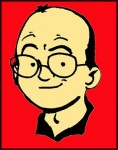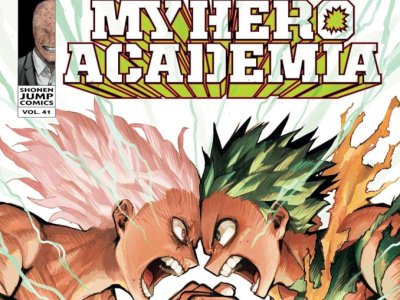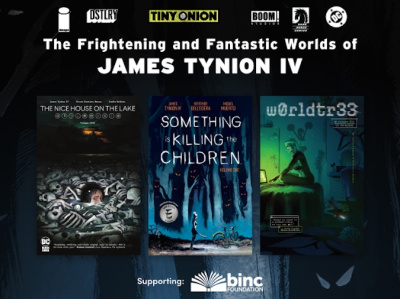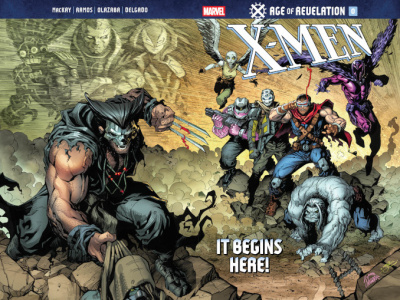
I Think I Can Manage is a regular column by retailer Steven Bates, who runs Bookery Fantasy, a million dollar retail operation in Fairborn, Ohio. This week Steven Bates looks at writers from other fields tackling comics:
Despite an overall drop in comic book sales in recent years, Marvel and DC have been steadily improving the quality of their storytelling over the past decade. This may, in part, be a case of learning from the past; writers and artists working today have the advantage of seeing everything that has gone before, both good and bad. Unlike the pioneers of our industry, who created from whole cloth an art form that combined the visual elements of cartooning and illustration with a diverse literary goulash-part short story, part screenplay, part serialized fiction-contemporary creators are building on the foundation of those forebears.
Early writers, especially those employed by DC editor Julius Schwartz, came from a science fiction background, their comic book scripts natural extensions of the fantastic fiction, the imaginary tales, the amazing stories, of the pulps and digests popular back in the day. Today's storytellers, weaned on comic books, TV, and movies, are just as diverse a breed. Some come from journalism, others are novelists, screen-writers, actors, and animators. At least two are Pulitzer Prize winners. One thing they all share is a love of the medium, and an appreciation for the rich history woven by their predecessors.
Marvel, in particular, has utilized to great advantage writers from a wide spectrum of experiences. J. Michael Straczynski, a veteran television writer and novelist, and creator of the epic science fiction TV series Babylon 5, has been redefining Amazing Spider-Man for over four years, and will soon tackle Marvel's first family, The Fantastic Four. Similarly, Buffy the Vampire Slayer's 'father' Joss Whedon recently adopted Professor Xavier's mutant brood, racking up huge sales for Astonishing X-Men. Playwright Roberto Aguirre-Sacasa has brought his Shakespearean expertise to both the Marvel Knights 4 and the X-Men's solo Nightcrawler. At DC, novelist Greg Rucka has brought his crime noir stylings to the spandex-heavy Batman universe, grounding Gotham City's guardian in a grittier reality. Brad Meltzer, who also writes 'real books' about cops and robbers, has successfully married the finer elements of popular fiction with the four-color format, most recently in DC's critical and commercial juggernaut, Identity Crisis. Film-maker Kevin Smith, perhaps the most notorious of the 'crossover creators,' has built his reputation on edgy storytelling, witty dialogue, bold characterization, and irreverent themes (that, and an inability to stick to a deadline).
The latest entrant to this fraternity is Reginald Hudlin, writer of Marvel's revamped Black Panther. To be honest, Marvel's hiring of Hudlin, an African-American Hollywood writer-director (House Party, Boomerang, Bernie Mac Show), to author African super-hero Black Panther seemed like the comic book equivalent of 'stunt casting.' Possibly inspired by the old adage 'write what you know,' editors sometimes place creators on books hoping that their sexual, racial, or religious affiliations will bring a more honest voice to the characters. Of course, finding alien supermen and water-breathing Atlanteans gets difficult, but you do what you can do, right? So Hudlin, a black guy, gets to write about another black guy (remember how well it went when black artist Kyle Baker's artwork for Truth for Marvel was slammed as 'racist' by critics of every color, even those aware that Baker himself was an African-American?).
Not being a big fan of House Party or Boomerang, I expected the worst, a tasteless gumbo of over-the-top jokes and urban black shtick, peppered with rap references and a smattering of smug race/self-deprecation. What I got was a rich, engaging, and thoroughly original look at a Marvel character that has been routinely mishandled since his inception. In the hands of earlier Marvel creators, Wakandan King T'Challa was portrayed as the noblest of men, with nary a fault and about as much personality to boot. Whether facing evil white South African super-villains like Klaw or American redneck Klansmen, Black Panther was ever the very model of a modern major hero. Sure, he was royalty, but so are Prince Charles' boys William and Harry. The first time I felt T'Challa was given any real depth was in the hands of Christopher Priest in the most-recently published series prior to Hudlin's relaunch. Priest made Black Panther human, with all the flaws any man might have, and somehow simultaneously made us believe-for the first time-that T'Challa (and Wakanda) were nothing to mess with.
Hudlin picks up where Priest left off, thematically, if not literally. Weaving a tale that shows, in one issue, the true legacy of the historical Black Panther, and sets the stage for at least one story arc examining Wakanda's, and T'Challa's, place in the modern world, House Party Hudlin sucked me in with great, natural dialogue and genuine human drama. Though there was humor, it worked within the context of the story, and even the modern euphemisms used by ancient African warriors served to paint a picture of a universal experience.
Of course, Hudlin can't take all the credit for Black Panther's success. John Romita Jr.'s art has never looked better. You can almost hear the wind in the tall grass of the Wakandan veldt, smell the fear of Dutch-Afrikaans facing down one of T'Challa's ancestors, taste the blood and sweat and tears of the Black Panther's enemies. The action, if you can call it that, is largely suggested, or 'off-screen,' allowing for a more imaginative interaction by the reader that draws you in deeper to the reality Hudlin & Romita have crafted. Black Panther should be on everyone's pull list, and retailers need to get behind this book in a big way. Not because it's controversial, or because Hudlin's a cross-over creator, or because Newsweek tells you to pick it up. No, Black Panther deserves support because it's good.
Marvel books have regained respectability, both with consumers and with critics. And I credit that largely to the fresh talent Marvel has imported to helm them. And the hits just keep on coming: I'm practically giddy with anticipation to read Allan (The OC) Heinberg's Young Avengers, and I don't even watch the show. Marvel's hiring of writers from outside the comic book industry might be a stunt, but it's a one that's paying off.







